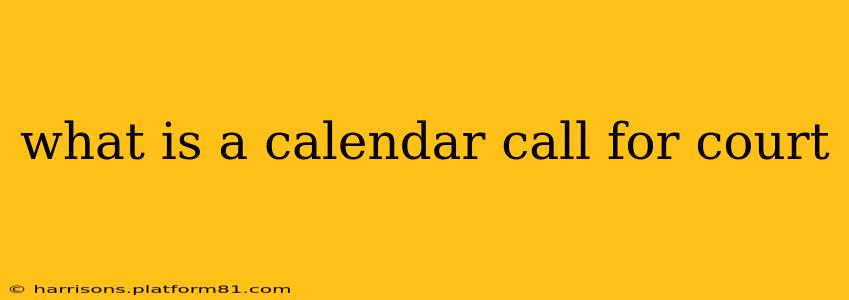A calendar call is a court procedure where attorneys and/or self-represented litigants appear before a judge or court clerk to provide updates on the status of their cases. It's essentially a progress check, helping the court manage its docket and ensure cases move efficiently toward resolution. Think of it as a brief check-in to keep things on track. It's not a full hearing where evidence is presented; instead, the focus is on procedural matters and scheduling.
What Happens During a Calendar Call?
The specifics of a calendar call vary by jurisdiction and court, but generally, the following occurs:
- Case identification: The court clerk or judge calls each case scheduled for the calendar call.
- Status update: Attorneys or parties report on the progress of their case. This might include updates on discovery (the process of gathering evidence), settlement negotiations, or upcoming motions (formal requests to the court).
- Scheduling: The judge may set deadlines for completing various stages of the case, schedule future hearings (such as pretrial conferences or trials), or manage other procedural matters.
- Addressing issues: Any issues or disputes between parties might be briefly addressed, but complex legal arguments are typically saved for more formal hearings.
- Continuances: If a case isn't ready to proceed, a continuance (postponement) might be granted. This often requires a showing of good cause for the delay.
Why are Calendar Calls Important?
Calendar calls serve several crucial purposes:
- Case Management: They help the court efficiently manage its caseload, ensuring cases proceed promptly and don't get bogged down.
- Early Issue Identification: Potential problems or roadblocks can be identified early, allowing the court to intervene and provide solutions before they escalate.
- Improved Efficiency: By streamlining communication and setting deadlines, calendar calls can contribute to quicker resolutions and reduce overall court congestion.
- Settlement Promotion: The process can sometimes facilitate settlement negotiations by providing a structured environment for parties to discuss the status of their cases and potential resolution paths.
What if I Don't Attend a Calendar Call?
Failure to appear at a scheduled calendar call can have serious consequences. The court may:
- Dismiss the case: In some instances, failure to appear might result in the dismissal of your case.
- Issue sanctions: The judge could impose sanctions, such as fines or other penalties.
- Issue a default judgment: If you are a defendant, failure to attend might lead to a default judgment against you, meaning you lose the case without a full hearing.
How Can I Prepare for a Calendar Call?
Preparation is key to a successful calendar call. This includes:
- Reviewing your case file: Ensure you have a complete understanding of the case's status and any outstanding issues.
- Knowing the deadlines: Be aware of all upcoming deadlines and be prepared to report on your progress toward meeting them.
- Preparing a brief summary: Have a concise summary of the case's status and any updates to report to the judge or clerk.
- Consulting your attorney: If you have an attorney, work closely with them to prepare for the calendar call.
What is the difference between a calendar call and a hearing?
A calendar call is a brief procedural check-in, focusing on scheduling and procedural updates. A hearing, on the other hand, is a more formal proceeding where evidence might be presented, witnesses may testify, and arguments are made before the judge. A calendar call is a much less formal event.
What if I have questions about my calendar call?
If you have questions or concerns about a calendar call, contact the court clerk's office immediately. They can provide specific information regarding your case and the procedures you should follow.
Understanding the purpose and procedures of a calendar call is crucial for anyone involved in a court case. Proper preparation and attendance can contribute significantly to the efficient resolution of your legal matter. Remember, if you are unsure about anything, always seek advice from an attorney or court personnel.
